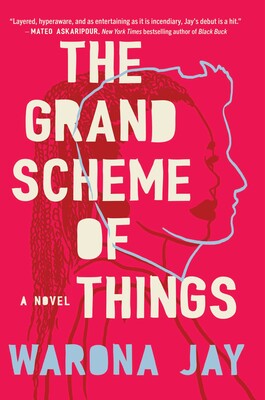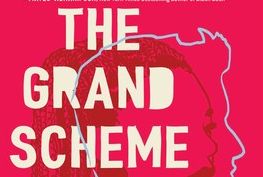

A couple of months ago, I read Yellowface by R.H. Kuang. While I enjoyed it for all the juicy drama (and gave it four stars), part of my critique was that the characters felt two-dimensional, making the book seem less about people and more about the issues on which the author wanted to opine. So I picked up Warona Jay’s debut, The Grand Scheme of Things, which has a similar theme – a white creative using the work of a person of color to achieve success – expecting similar fare.
Instead, I got a dramatic story with complex characters that explores how racism, sexism, and creative gatekeeping impact the humans who live within these systems. The premise of the book is that a young, black, queer, immigrant woman living in London named Relebogile Naledi Mpho Moruakgomo a/k/a “Eddie” has written a brilliant play and can’t find representation. She meets a wealthy white man named Hugo Lawrence Smith at a coffee shop, and they strike up a friendship based on a shared love of theater. Eddie decides to ask Smith if he’ll submit her work to the theater company that has just rejected her, to test her theory that they are discriminating against her.
The play is acquired, and in the beginning, Eddie is thrilled. She’ll finally get to see her play realized and have the confirmation of how good she is. Hugo is a fairly decent, if not nauseatingly privileged man, and he tries to do right by Eddie, but his limitations in this regard are plenty. Things start to unravel once Hugo foolishly starts an affair with the play’s director – another woman of color – and Eddie’s lies begin to catch up to her.
Unlike the cartoonishly horrible people in Yellowface, the characters in The Grand Scheme of Things are far more nuanced. Each has virtues and flaws, and each has to battle with themselves over doing the right thing vs. pursuing their agenda. Nothing about this is tidy. It’s written in parts, alternating between Eddie’s and Hugo’s points of view. Jay did a great job of “becoming” each narrator, immersing the reader in each character’s thoughts, feelings, and conflicts. The other style choice I love is that Jay has written the dual narrative as Eddie and Hugo speaking to one another. This adds an incredible layer of intimacy I wasn’t expecting and enjoyed very much.
I loved this book. Eddie was a compelling main character, and I related to her desire to have her work recognized and receive affirmation of its value. I liked Hugo, too, even though he was an idiot. Mainly because it was fun to watch a white man who – ostensibly wanted to do the right thing – get tripped up on all the ways his privilege keeps him from having to deal with the realities Eddie lives with and by.
Overall, this is one of my favorite books I’ve read so far in 2025. Get on it!

